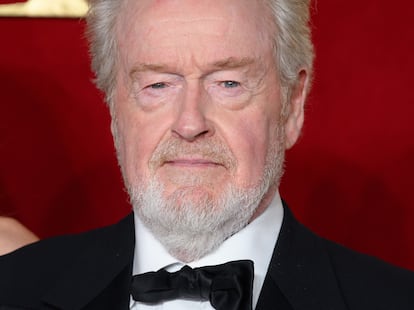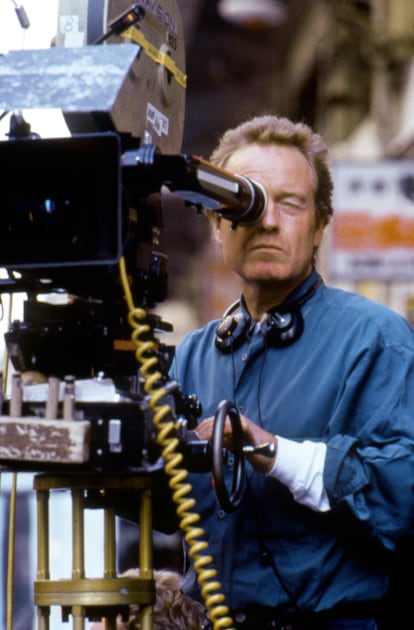Ridley Scott’s dizzying career at 87: Big hits, epic flops and multimillion-dollar budgets
While ‘Gladiator II’ has been a box office triumph, his recent body of work has divided both critics and audiences


At 87, with the box office success of Gladiator II added to his legendary career, Ridley Scott is in a position to speak his mind. Like Clint Eastwood, who at 94 has just released another movie Juror No. 2, Scott has made it clear that he will keep directing as long as he’s able. During his latest promotional tour, he couldn’t resist poking fun at Quentin Tarantino’s retirement plans, urging the 61-year-old director to “shut up and go make another movie.”
Scott’s remarks during interviews this year have been just as bold. After facing criticism for his portrayal of Napoleon in Napoleon (2023), he declared, “The French don’t even like themselves,” and quipped that historians should “get a life.” While discussing Gladiator II, Scott admitted that he wasn’t sure if sharks inhabited the Nile during Roman times but chose to forge ahead regardless. He also recalled witnessing a baboon attack in South Africa that inspired the digital baboons in a fight scene in the sequel.
On directing at nearly 90, Scott compares himself to a “Formula 1 car” speeding ahead. Perhaps his most striking statement this year was when he told Empire that Gladiator II was “the best thing” he’s ever made. Though the sequel has garnered mixed reactions, Scott later politely backtracked: “It’s one of the best things. I’ve made a few good ‘uns.” What remains undeniable is his relentless drive, like the racing car he compares himself to. In April, he’ll shoot a sci-fi film in Italy with Paul Mescal, which Scott claims boasts “the best script” he’s read in a decade. By September, he’ll begin a Bee Gees biopic, and he’s already discussing a possible third Gladiator, inspired by The Godfather: Part II (1974).

Scott’s prolific output — which has intensified in recent years — has not been met with overwhelming praise. Quite the opposite. His recent films, including some of his priciest, display ambition, but critics note an imbalance between their grandeur and the director’s approach, which can seem dismissive. John Mathieson, the cinematographer of Gladiator II, criticized Scott for his “lazy” and “impatient” method of using multiple cameras for quick shots, in order to shoot all the shots in the fewest possible takes. “It’s not very good for cinematography,” he told The DocFix Documentary Storytelling Podcast, explaining it means you “can only light from one angle.” “Look at his older films and getting depth into things was very much part of lighting. You can’t do that with a lot of cameras, but he just wants to get it all done,” he added.
The writer and film essayist Jorge Fonte, author of Ridley Scott, shares his disenchantment with the director’s recent work. “Honestly, I haven’t seen Gladiator II,” he tells EL PAÍS, explaining he was worried it would bore him. “I was lucky enough to finish the book [Ridley Scott] with The Martian (2015), which is, broadly speaking, the best of the last stage.” He continues: “I did see the theatrical version of Napoleon, not the extended one, which I was feeling lazy about seeing, and it bored me a lot. When you see Napoleon bombing the pyramids [of Egypt], you disconnect. The story isn’t well told, and Joaquin Phoenix looks like he took acid before filming. Between battles, you fall asleep, then wake up with the cannons.” As for the much-discussed pyramid sequence, Scott argued: “it was a fast way of saying he took Egypt.”
Fonte observes that throughout his career, Scott has experienced “many ups and downs, producing both monumental films and others that he could have spared us.” He is particularly struck by the link between Scott’s current approach and the fast-paced demands of the film industry today. Has Ridley simply become a master of churning out big budget movies perfectly fit for the streaming age?
“All the Money in the World (2017) and House of Gucci (2021) are almost the same,” says Fonte. “And The Last Duel [2021] seemed to me to be too long a film for such a small story. I didn’t need two and a half hours for that.”
Restoring Marcus Aurelius' dream
Ridley Scott, who began his career as a visionary science fiction director and a master of advertising language, has become synonymous with grand epic productions in the second half of his career. Although historical themes have always intrigued him, as evidenced by his debut film The Duellists (1977) and his less successful 1492: Conquest of Paradise (1992) — which, as he revealed recently, he plans to re-release with a new four-hour cut — his tremendous success with Gladiator (2000) established him as the director who revitalized the sword-and-sandal genre. Along with The Lord of the Rings (2001), Scott’s film helped lay the foundation for 21st-century cinema and initiated a new golden age for epic adventure films, a trend he would revisit with mixed results in Kingdom of Heaven (2005), Robin Hood (2010), and Exodus: Gods and Kings (2014).
Andrew B.R. Elliott, a British researcher specializing in the representation of history in fiction, edited The Return of Epic Film: Genre, Aesthetics & History in the 21st Century (2014), a book that examined the resurgence of epic cinema. Elliott argues that Scott’s work evokes not just the past but a living, breathing world. “His Colosseum brings Ancient Rome to life in a way that an actual visit to the authentic Colosseum cannot achieve,” he tells EL PAÍS. He adds that Scott’s painterly style, with its meticulous attention to staging, enables us to experience history in a way that makes it feel alive.
Elliott believes that the successive waves of epic cinema in Hollywood mark the point in which directors of different generations cross the threshold to adulthood. In the case of Ridley Scott, he connects his return to the genre to the legacy of iconic filmmakers like Anthony Mann, William Wyler, Giovanni Pastrone, and Cecil B. DeMille.
“There is something autobiographical in that instinct,” says Elliot. “The return to the epic in the 2000s marks the maturity of directors who recreate the epic productions of their youth in the 1950s and 1960s, which in turn paid homage to those of the 1920s and 1930s, and so on.”
Aside from the famous “echo in eternity” referenced by Russell Crowe’s character, it’s clear that both Gladiator films reflect contemporary issues, such as the decline of an empire, marked by corruption, inequality, tyranny and bread and circuses. However, Elliott argues that Scott’s success isn’t driven solely by this sense of zeitgeist.
“I think that kind of statement misses the mark,” he says. “Kingdom of Heaven is a good example: of course a 2005 film about the Crusades will inevitably deal with (and be consumed by) contemporary conflicts in the Middle East, but almost all the earlier Crusade films also resonate their time. Any reflection on the past, if it’s good, resonates.”
For Fonte, Scott’s great contribution to epic cinema has been bringing realism to epic battles. “Before, you saw Richard Burton, and he looked like he had just come from the car wash, he didn’t even break a sweat fighting. That realism in the elements of the battles, in which you get dirty with mud, blood, snow... is something to be grateful for. The vision we have now of imperial Rome is very much influenced by him,” he tells EL PAÍS.
Scott’s artistic identity is closely tied to that of fellow British director Stanley Kubrick, with Spartacus (1960) being a key influence on Gladiator. When Scott embarked on Napoleon, some saw it as a response to Kubrick’s unfinished Bonaparte project, though Scott’s take on the emperor surprised many with its comedic tone, especially in the extended three-and-a-half-hour version. The film suggested that Scott’s focus wasn’t on ambition or grand deeds, but on depicting Napoleon as a tragically flawed figure, subtly undermining the significance of past directors who had failed to tackle the same subject.
For a director known for handling grand budgets and monumental sets, Napoleon suggested that Scott’s interest lay not in pursuing ambitious feats or extraordinary deeds for their own sake, but rather in portraying the tragic, flawed nature of his protagonist. This approach subtly undercut the significance of Kubrick and Abel Gance, both of whom had tried and failed to make a definitive Bonaparte film, with Scott’s interpretation serving as a commentary that downplayed their unfinished efforts.
Given the speed at which he completes assignments and the uncertain degree of his involvement in the scripts of his films — he has admitted to intervening, though without receiving credit, as he doesn’t belong to the union — it would be bold to try to extract authorial discourses from Scott’s work. Nevertheless, Napoleon provides a window into a certain bitter cynicism.
A profile in The New Yorker on the occasion of his penultimate film highlighted another key aspect of Scott’s recent years: the suicide of his brother, director Tony Scott, in 2012. Just before taking his life, Tony had allegedly received a phone call from Ridley, who tried to encourage him to overcome his emotional slump by working on a new project. “Ridley once told me that he has been dogged by deep depression his whole life,” said biographer Paul Sammon. “He calls it ‘the black dog,’ which is what Churchill called it. He says, ‘If I stop, I find myself sinking.’”
Gladiator II has achieved the biggest commercial opening of Scott’s career, and has grossed over $320 million worldwide. Scott continues to forge ahead, pushing past both his critics and the “black dog” of depression. For those with doubts about Scott’s recent work, columnist Stuart Heritage pointed out in The Guardian that there is a silver lining: “The good news is that there will be more interviews with Ridley Scott.”
Sign up for our weekly newsletter to get more English-language news coverage from EL PAÍS USA Edition
Tu suscripción se está usando en otro dispositivo
¿Quieres añadir otro usuario a tu suscripción?
Si continúas leyendo en este dispositivo, no se podrá leer en el otro.
FlechaTu suscripción se está usando en otro dispositivo y solo puedes acceder a EL PAÍS desde un dispositivo a la vez.
Si quieres compartir tu cuenta, cambia tu suscripción a la modalidad Premium, así podrás añadir otro usuario. Cada uno accederá con su propia cuenta de email, lo que os permitirá personalizar vuestra experiencia en EL PAÍS.
¿Tienes una suscripción de empresa? Accede aquí para contratar más cuentas.
En el caso de no saber quién está usando tu cuenta, te recomendamos cambiar tu contraseña aquí.
Si decides continuar compartiendo tu cuenta, este mensaje se mostrará en tu dispositivo y en el de la otra persona que está usando tu cuenta de forma indefinida, afectando a tu experiencia de lectura. Puedes consultar aquí los términos y condiciones de la suscripción digital.








































